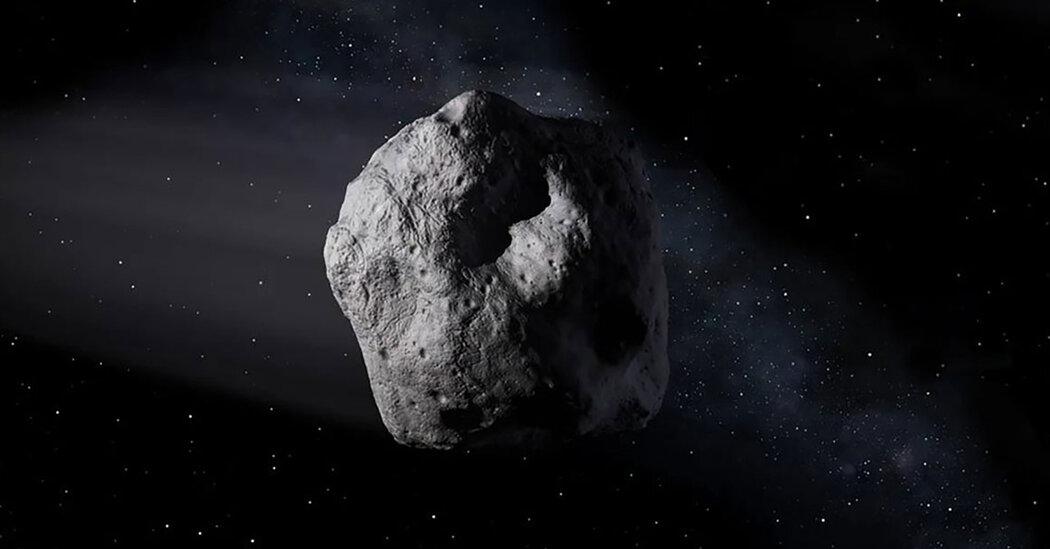For a few months last fall, a school-bus-size space rock named 2024 PT5 gained fame as Earth’s new “mini-moon.” Astronomers rushed to study the object while it was still close enough to Earth to observe in detail.
Now, one team has concluded that 2024 PT5 is a chunk of the real moon. The rock was most likely flung into space by an impact on the lunar surface that occurred sometime within the past tens of thousand years, according to a study published earlier this month in The Astrophysical Journal Letters.
This is the second time scientists have linked a near-Earth object to the moon, after a 2021 study identified the object 469219 Kamoʻoalewa as possibly lunar in origin. Taken together, the research reveals a population of exiled moon rocks, or “lunar ejecta,” that has remained hidden up until now.
“We knew that lunar ejecta were potentially hiding in these kinds of really near-Earth orbits,” said Teddy Kareta, a postdoctoral researcher at Lowell Observatory in Arizona who led the research.
Earth often encounters drifting objects, including asteroids or meteoroids, that can become temporary moons or “quasi-satellites.” Advanced observatories, such as the Asteroid Terrestrial-impact Last Alert System, or ATLAS, are designed to spot these fellow travelers, which are typically visible for only weeks or months.
2024 PT5 was initially detected by ATLAS on Aug. 7, a discovery that galvanized follow-up observations around the world. On Aug. 16, Dr. Kareta and his colleagues spied the object with the Lowell Discovery Telescope in Arizona and the NASA Infrared Telescope Facility in Hawaii.
Dr. Kareta compared the light patterns reflected off the rock to how light has been observed bouncing off other extraterrestrial surfaces. He discovered a strong match with silicate-rich lunar grains collected by Apollo crews and a Soviet robot lander. The object also followed a distinctive “horseshoe” trajectory during its encounter with Earth, a fact that hints at a local origin.
The rock’s meandering path ignited debate over whether the object should really be called a mini-moon, as it never entered Earth’s orbit. But the term is still used loosely in both academic and popular contexts.
“In a formal sense, this object did not orbit the Earth, but it was really, really close,” Dr. Kareta said. “We don’t have a great vocabulary to describe the exact scenario for this object which, for a brief period of time, was barely moving with respect to the Earth.”
Vishnu Reddy, a professor of planetary science at the University of Arizona who reviewed the study, said the team did a “remarkable job” of assessing the possible origins of 2024 PT5.
“The circumstantial evidence makes the lunar option the most logical one,” said Dr. Reddy, who also previously served as a doctoral adviser to two of the study’s authors. “But unless you go and bring a sample back, you cannot tell for sure this is a piece of the moon.”
There are no current plans to gather pieces of 2024 PT5 to Earth for study on Earth. But China is developing a mission called Tianwen-2 to collect samples from 469219 Kamoʻoalewa, the other object pegged as a moon rock.
Raul de la Fuente Marcos, an astronomer at the Complutense University of Madrid who was not involved in the study, called it a “compelling case” for a lunar origin of 2024 PT5. This explanation aligns with his own team’s findings in a forthcoming paper that identified a third rock, 2022 NX1, as yet another possible piece of the moon.
This growing family of moon rocks around Earth is packed with insights about our planetary backyard. One study has already tried to trace the origins of 469219 Kamoʻoalewa back to the moon’s Giordano Bruno crater, raising the possibility of matching future rocks to specific lunar sites. These efforts could illuminate the processes that shape lunar rocks on and off the moon — while also satisfying the popular demand for new mini-moons.
“It’s good to see the public interested in asteroids that aren’t going to kill us,” Dr. Kareta said. “What a pleasure.”


